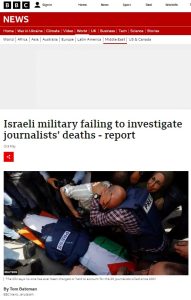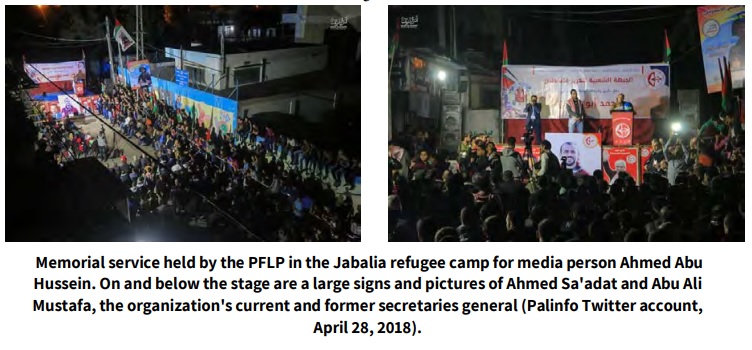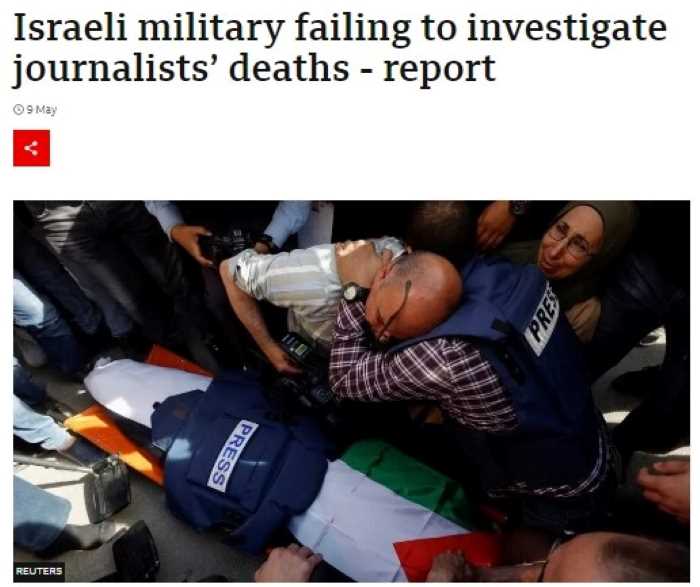On the afternoon of May 9th the BBC News website published an article by the Jerusalem bureau’s Tom Bateman under the headline ‘Israeli military failing to investigate journalists’ deaths – report’.
As stated in the article’s second paragraph, the report mentioned in that headline was produced by the Committee to Protect Journalists (CPJ). Readers are not told that it was launched at a press conference held at the Hilton hotel in Tel Aviv less than three hours before Bateman’s article appeared, after having been announced on May 1st.
Both the press release and the CPJ report itself promote linkage between the date of its release and the anniversary of the death of Al Jazeera journalist Shireen Abu Akleh two days later. Notably, when Bateman published an article about that anniversary on May 11th, he promoted a link to this May 9th article:
“The anniversary comes in the same week as a reporters’ safety watchdog found Israeli forces had killed at least 20 journalists since 2001 in cases showing a pattern of “inadequate responses that evade accountability”. Israel rejected its findings.”
Interestingly, Bateman’s May 9th article does not provide readers with a link to the CPJ report itself which may suggest that the BBC had received an advance copy and that it was written before the report was made public.
Bateman opens his article as follows:
“Israeli forces have killed at least 20 journalists since 2001 in cases showing a pattern of “inadequate responses that evade accountability”, a watchdog says.
A report by the Committee to Protect Journalists (CPJ) describes routine obfuscation and failure to properly investigate by the Israeli military.
It says the journalists’ deaths and insufficient responses constitute a “grave threat to press freedom”.
It comes ahead of the first anniversary of the killing of Shireen Abu Aqla.”
He goes on to mention the Abu Akleh case and two others:
“Among other cases highlighted in the report are those of Palestinian video journalist Yaser Murtaja and freelance reporter Ahmed Abu Hussein, both of whom were shot dead by Israeli snipers in separate incidents while they covered Palestinian protests at the Gaza perimeter fence in 2018.
The Palestinian journalists’ union at the time accused Israel of “deliberately” targeting them.
The Israeli military told the report that the two journalists were “allegedly present at the scene of violent riots” and “no suspicion was found which would justify the opening of a criminal investigation” into the soldiers.
In the case of Murtaja, the CPJ report says Israel’s then-defence minister Avigdor Liberman spent weeks “trying to discredit the journalist” by saying he was a senior member of the armed wing of the Palestinian militant group Hamas, without presenting any evidence.
It later emerged that the journalist had been vetted by the US to receive international development funding for his production company.
In the case of Abu Hussein, human rights campaigners filed a request for the military to investigate his death.
But the CPJ report says the IDF closed the case two years later without interviewing any witnesses, saying there was no criminal intent by the soldiers.”
Bateman’s uncritical amplification of the CPJ report fails to inform readers that the “Palestinian protests at the Gaza perimeter fence in 2018” were in fact the ‘Great Return March’ violent riots which were pre-planned by Hamas and its partners and which went on for months.
As we see, Bateman simply reproduces some of the claims concerning Murtaja and Abu Hussein that appear in the CPJ report without providing readers with any additional relevant information such as the former’s links to Hamas, the fact that the latter (who was treated in an Israeli hospital) worked for a radio station affiliated to the PFLP terrorist organisation which put out a formal notice concerning his death and held a memorial event for him.

Bateman also fails to note the notorious unreliability of the politicised “Palestinian journalists’ union” (i.e. Palestinian Journalists’ Syndicate) and its involvement in lawfare against Israel.
Neither does Bateman bother to inform BBC audiences that among the rest of the “at least 20 journalists” killed over more than two decades are at least six others who were either members of terrorist organisations (for example Khaled Hamad), present at a Hamas facility or employed by media outlets belonging to terrorist organisations at the time of their deaths. Notably, Bateman has no comment to offer on the topic of the CPJ’s portrayal of people employed by the media arms of designated terrorist organisations as journalists and civilians.
Bateman’s report is hence nothing more than churnalism: the uncritical amplification of a press release or a report put out by a third party. While that practice is not rare at the BBC, it is worth noting that this particular narrative – and not least its connection to the topic of the death of Shireen Abu Akleh, which Bateman and his colleagues have vigorously promoted over the past year – links to an unevidenced allegation that some BBC journalists have been promoting for many years.
Needless to say, the safety of journalists while doing their job is an important issue. So too is the abuse of journalism and journalists by terrorist organisations and repressive regimes but neither Tom Bateman nor the CPJ appear to be overly interested in that aspect of the story they chose to promote.
Related Articles:
BBC’S BATEMAN PROMOTES ABU AKLEH ANNIVERSARY PUBLICITY
BBC REPORTING ON GAZA BORDER RIOTING CONTINUES TO AVOID CORE ISSUE
AFP CORRECTS REGARDING 17 ‘JOURNALISTS’ KILLED IN GAZA (CAMERA)






This is akin to the current vogue in the BBC in their News Bulletins. It goes somewhat like ” Mr. X will today deliver a speech at Y in which he WILL say………….” – its woke reporting since Mr. X may not even say what was in the release of his speech he gave the BBC!
Bateman should be persona non grata in Israel and have his Press Card removed!
The simple answer to the problem for the journalists, is stand well away from any trouble, indeed standing on the Israeli side would almost guarantee they would not get caught in the crossfire, but their allegiances are with their brothers and sisters to produce their one sided reports and broadcasts, as Bateman knows only too well, along with his foolhardy M. E. editor Bowen. Yes stand in the middle of the confrontation and then complain when you get shot or blown up, #defundthebbc